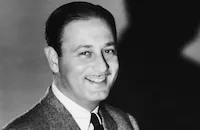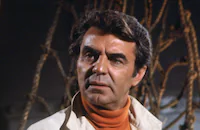Fort Worth

Brief Synopsis
Cast & Crew
Edwin L. Marin
Randolph Scott
David Brian
Phyllis Thaxter
Helena Carter
Dick Jones
Film Details
Technical Specs

Synopsis
Ned Britt, a gunfighter turned newspaperman who has a reputation for exposing wrongdoers, travels by wagon train from Kansas to San Antonio with his partner, Ben Garvin, and copy boy Luther Wicks. Along the way, the train is joined by Flora Talbot, whose father had employed Ned years ago in Fort Worth, and who is now engaged to Ned's old friend, cattle buyer Blair Lunsford. The wagons cross paths with trail boss Gabe Clevenger, who is driving a herd to Kansas City. The violent Clevenger tangled with Ned fourteen years earlier and is determined to prevent him from returning to Texas. At night, Happy Jack Harvey, one of Clevenger's gunmen, challenges Ned to a fight. Ned, who was sickened by the killings in the Civil War, refuses to put on his guns, but Harvey fires anyway and starts a cattle stampede, during which young Toby Nickerson is trampled to death. Disgusted with Ned's position as a man of words, Flora taunts him to take action and he retorts that he will fight Clevenger with the power of the press. In Fort Worth, Ned learns from Blair that lack of work has driven away much of the town's population. However, Blair insists, that the advent of the railroad will turn Fort Worth into a center for shipping cattle. Clevenger has been terrorizing the town because the railroad will end his cattle-driving business, and the town sheriff is too afraid of Clevenger's violent gunmen to arrest him. Eager to share Blair's vision and intent on enacting revenge on Clevenger, Ned agrees to stay in Fort Worth and start a newspaper. Meanwhile, Garvin discovers that Blair is buying property cheaply from departing residents and hints to Ned that perhaps Clevenger's lawlessness suits Blair's purpose by driving away the townspeople. One day, Amy Brooks, Ned's former fiancée, returns to Fort Worth, and he invites her to join him, Blair and Flora at dinner. However at dinner, Amy unexpectedly reveals that Blair became her lover after Ned left town to join the army and denounces Blair for breaking off their relationship in favor of Flora's land and money. A furious Blair accuses Ned of instigating Amy's allegations because he is in love with Flora himself. When Ned returns to the office, he discover's Gavin's body, stabbed in the back by a knife like those used by one of Clevenger's men. The death of his friend drives Ned to appoint himself as deputy sheriff and shoot down Garvin's killer. Several townspeople then announce that the paper's editorials have roused them to form a vigilante group to fight Clevenger, and later, Ned learns that Blair is behind the vigilante group. Despite the efforts of the vigilantes, Clevenger attacks a train carrying Blair and the railroad men he is trying to woo to Fort Worth. In retaliation, Blair asks Ned to help him set a trap to catch Clevenger. Ned agrees, but once they are on the train, Blair turns on his old friend, disclosing that Garvin's suspicions were correct and that he now plans on killing Ned and Clevenger. Blair locks Ned in a railroad car and sets it on fire, but Ned is able to escape and pursue his former friend. He finds Blair at Flora's and challenges him to a fight. Blair angrily leaves, and Ned tells Flora that he will expose Blair in the next issue of the paper. While Ned is alone in his office, Blair confronts him and admits all his wrongdoing, then pulls his gun. Before he can kill Ned, Flora shoots him from outside, where she has heard everything. Clevenger then tries to kill Ned, but Ned shoots him first. Later, the railroad arrives, and Fort Worth is set to become a major city. Ned's satisfaction is complete when Flora, now his wife, reveals that she is pregnant.

Director

Edwin L. Marin
Cast

Randolph Scott

David Brian

Phyllis Thaxter
Helena Carter

Dick Jones

Ray Teal
Lawrence Tolan

Paul Picerni
Emerson Treacy

Bob Steele

Walter Sande
Chubby Johnson
Zon Murray
Pat Mitchell
Grace Mills
Charles Meredith
Ted Mapes
Sheb Wooley
Carl Andre
Don Harvey
Robert Williams
Leo Mcmahon
Duke York
Rush Williams
Elzie Emanuel
Steve Clark
Ed Peil Sr.
James Adamson

Greg Barton
Kermit Maynard
Crew
Gordon Bau
G. W. Berntsen
Marjorie Best
David Buttolph
Stanley Fleischer
Oliver S. Garretson
Chuck Hansen
Sid Hickox
H. F. Koenekamp
Clarence Kolster
Mitchell Kovaleski
William Mcgann
John Twist
Anthony Veiller

Film Details
Technical Specs

Articles
Fort Worth
The film opens on a wagon train with Scott in familiar form in buckskin and riding a horse like a scout or a trail hand. His character, Ned Britt, is no stranger to a gun but he's traded his revolvers for a printing press and has come to Texas to find a growing town big enough to support a newspaper. Fort Worth, his hometown, is merely a stop along the way until his childhood friend Blair (David Brian) shares his dream of making Fort Worth a major cattle town and shipping hub in the territory and convinces Ned to help him grow the town. Standing in their way is cattleman Gabe Clevenger (Ray Teal), whose cowhands and gunmen run wild through the town. He's determined to keep the railroad (and the civilization that comes with it) far from Fort Worth. The script by western veteran John Twist complicates things when Ned discovers that his buddy is making a fortune thanks to the chaos unleashed by Gabe. The shifting tensions between the three keeps the drama curiously off balance for a genre where the good guys and bad guys are usually easy to sort out, while the action is sustained by gunfights, hold-ups, and a climactic railway robbery. The budget-minded film makes effective use of the Warner backlot and the nearby Warner Ranch, located just outside of Los Angeles
Phyllis Thaxter, newly arrived at Warner Bros. from a busy career at MGM, co-stars as Flora, the tomboy who grew up with young Ned now grown into a beautiful, capable woman torn between Ned and Blair. David Brian, who made his film debut opposite Joan Crawford in Flamingo Road (1949), starred in Intruder in the Dust (1949) and in the radio and TV courtroom drama series Mr. District Attorney, but to later generations he's remembered as the Fascist figurehead in the "Patterns of Force" episode of the original Star Trek TV series. Ray Teal, a familiar face from hundreds of movies and TV shows, is probably best known as Sheriff Roy Coffee in the TV western Bonanza. And Luther, the spunky copy boy and apprentice reporter on Scott's newspaper, is played by Dick Jones, a former child star (under the name Dickie Jones) and voice of Disney's Pinocchio (1940) who went on star in the TV westerns The Range Rider and Buffalo Bill, Jr..
The prolific Edwin L. Marin made almost 60 films in two decades, among them the 1938 A Christmas Carol, the modest film noirs Johnny Angel (1945) and Nocturne (1946) with George Raft, and the energetic John Wayne western Tall in the Saddle (1945). He first directed Randolph Scott in Abilene Town (1946) and ultimately made a total of seven westerns in five years with Scott. Fort Worth was the final film that Marin completed before his death on May 2, 1951, two months before the film debuted.
Sources:
Randolph Scott: The Gentleman from Virginia, Jefferson Brim Crowe. WindRiver Publishing, 1987.
The BFI Companion to the Western, ed. Edward Buscombe. Da Capo, 1988.
The Warner Bros. Story, Clive Hirschhorn. Crown, 1979.
AFI Catalog of Feature Films
By Sean Axmaker

Fort Worth
Quotes
Trivia
Notes
Fort Worth was the last film of long-time director Edwin L. Marin (1899-1951), who died before the film's release. According to Hollywood Reporter, the studio was negotiating with James Millican, Jack Williams and Joe Smith to play roles in the film, but their appearance in the completed picture has not been confirmed. Portions of the film were shot on location at the Warner Ranch in Calabasas, CA.














